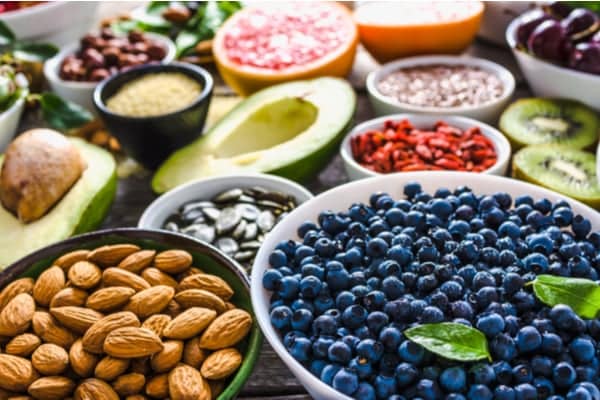Fad foods come and go, but one substance that continues to gain traction is MCT oil. Look around in health stores today, and you’re likely to see multiple products raving that they contain this metabolism-boosting superfood.
But what is MCT oil, and will it make a difference for your health? Below we talk all about MCT oil so you can decide whether you should add some to your diet.
What is MCT Oil?
More than just a buzzword in the health world, MCT (medium chain triglyceride) oil is one of the most bioavailable forms of energy in the world today. These natural fat sources create ketones that generate thermogenic effects for your body.
The majority of oils come in three sizes of fatty acid chains: short, medium, and long. Medium chain fatty acids typically contain between 6 and 12 carbon chains. These oils are composed of fatty acids naturally contained within coconut and palm oils. However, coconut and palm oils also include longer chain triglycerides that aren’t considered to be as healthy because the molecules are often stored as fat because they take longer for your system to metabolize.
Most of us are familiar with thinking about saturated fats as forbidden foods. However, their bad rap isn’t entirely earned because saturated fats like MCTs have incredible benefits for your health. Thanks to how quickly they can be digested, MCT oils are almost immediately metabolized into energy.
Longer chain fats like butter, beef fat, olive oil, and unprocessed forms of palm oil and coconut oil are burned more slowly and typically stored as fat instead. For this reason, most MCT products in stores are purified extractions of one or both of these oils, ensuring that they contain only MCTs.
Thanks to its energy-boosting abilities, MCT oil is most typically used by those who want to lose weight or improve their athletic performance.
How MCTs Work
In many ways, MCTs act like carbohydrates because they provide with a quick energy source. Unlike carbs though, MCTs won’t raise your blood sugar or increase insulin levels.
The mitochondria might not get much attention, but this small cell part is responsible for producing all the energy needed for your tissues to function. MCTs are one of the most efficient ways to fuel the mitochondria because they can quickly cross through the double mitochondrial membrane without L-carnitine, an enzyme necessary for LCT absorption.
This process produces acetyl-coA, which breaks down into ketones within your body.
About Ketones
Your body fuels itself with two primary energy sources: glucose and ketones. Glucose comes from sugars, starches, and proteins that are metabolically processed into blood sugar. Most people predominately burn this fuel type because of how common carbs are in their diet.
In contrast, ketones are substances produced by the liver when it breaks down fat, and they are uniquely suited to fueling the brain. You are more likely to rely on ketones if you fast, go on a low-carb diet, or follow a moderate protein, high-fat diet.
The body can make ketones from its stored fat or from digesting MCTs, which is why this oil chain is considered so valuable.
Dietary Fat and Your Health
If you follow a standard western diet, you probably aren’t getting an adequate amount of MCTs in your diet. This is because health nutritionists have long lead the public to believe that saturated fats should be avoided. However, recent research continues to reveal that these fats are far healthier than previously thought. Today, many nutritionists believe that saturated fats have benefits for your heart, brain, and waistline, especially if you eat them daily.
These substances both stabilize blood pressure and enhance your body’s energy production capabilities, making them a proven way to improve your metabolism, enhance cognitive function, and reduce inflammation.
Natural Sources of MCTs
Coconut oil and palm oil contain some of the best natural sources of MCTs, but you can find small amounts of this critical compound in a variety of foods, including goat’s milk, grass-fed butter or yogurt, and ghee.
Roughly 65 percent of the fats in coconut oil are MCTs, including concentrated caprylic, capric, lauric, and caproic acid with all the longer chain fatty acids removed.
Caproic Acid: As the smallest chain of MCT with just six carbon chains, caproic acid is only found in trace amounts of most food. This is a good thing, as too much can lead to digestive problems.
Caprylic Acid: Found in a 6% concentration is coconut oil, caprylic acid has 8 carbon chains and contains the most potent anti-microbial properties of MCTs.
Capric Acid: This 10-carbon chain MCT has potent anti-inflammatory properties and provides quick energy for cell mitochondria.
Lauric Acid: Making up roughly 50% of coconut oil fatty acids, lauric acid behaves similar to long-chain fatty acids and requires liver bile to be metabolized efficiently. Research shows that it acts as an anti-microbial, though capric and caprylic acid are more effective.
One fundamental difference between the functionality of coconut oil and concentrated MCT oil is that MCT oil has proportionally less lauric acid. This is because some of the compound are extracted out with MCT oils.

Get Your Free Guide to Becoming a Holistic Nutritionist
Learn about the important role of holistic nutritionists, what it takes to be successful as one, and how to build a lucrative, impactful career in nutrition.
5 Things You Need to Know About MCT Oil
High-quality MCT oil has many unique features that are worth knowing about before you decide to use the compound for cooking or other uses.
- No Taste: Because all flavors and scents are removed from MCT during processing, the oil is entirely tasteless.
- Liquid at Room Temperature: Unlike the oils it is derived from, MCT oil has a lower smoking point than coconut oil and will be liquid at room temperature.
- Easy to Absorb: High-quality MCT oils can be quickly converted into energy in your body, but cheaper generic brands are often blended with other fats to cut costs, making them less useful for absorption.
- Highly Soluble: The size of the carbon molecules in MCT oil increases their solubility in water and fluids like blood.
- Processed Efficiently: MCTs reach the liver quickly because they don’t have to go through peripheral tissues as LCTs do. Likewise, the medium chain acids don’t need to be broken down before your body can absorb them.
7 Uses of MCT Oil
Knowing that MCT oil is beneficial for your health and understanding the best way to take it are different matters. What are the best ways to take this clear, flavorless liquid? Here are things you need to know about MCT oil to ensure you’re using it right.
Thanks to its lack of flavor, MCT oil is impressively versatile in a variety of dishes, including the following.
- Cooking Oil: Concentrated MCT oil is excellent for cooking because it has a high smoke point and doesn’t add unwanted coconut flavor to the meal.
- Salad Dressing: Combine a tablespoon of MCT oil with herbs and vinegar for an extra healthy afternoon salad.
- Homemade Mayonnaise: Mix a tablespoon of MCT oil into your favorite mayonnaise recipe, and you won’t notice any difference in the overall taste or texture.
- Coffee & Tea: If you want to give your brain a boost first thing in the morning, add a teaspoon of MCT oil to your daily source of caffeine.
- Baked Goods: You can use MCT oil as a coconut oil substitute in baking recipes to boost the ketone production potential.
- Smoothies: For smoothie fans who want to stay full longer, you can add 2 tbsps. of MCT oil into the mix to curb hunger throughout the day.
- Straight off the Spoon: There’s no need to dress MCT oil up if you merely want to take it as a supplement for its health benefits. It’s best to start slowly with half a teaspoon a day and work your way up to one tablespoon over time.
Beyond consumption, there are plenty of other ways to take in the benefits of MCT oil. You can use the oil however coconut oil can be used, meaning that it can be a stellar ingredient in homemade lip balms, shaving creams, teeth whitening treatments, facial masks, and more.
Buying MCT Oil
Because commercially available MCT oils are often made from blends of both coconut and palm oils, they qualify as proprietary blends, meaning that the company doesn’t need to disclose the exact ratio of fats it contains. This makes it difficult to know precisely what MCTs are within your oil, and the proportions can vary considerably between brands. For this reason, the best strategy for you might be to experiment with several oil brands and try small samples until you find one that your body responds well to.
Using MCT Oil for Health and Wellness
Don’t worry about believing the hype about MCT oil- this product really does have the potential to make a difference in your health and energy levels.
To get the best benefits for your body, seek out ways to add some MCT fatty acids to your diet each day. Whether that’s from adding a spoonful of coconut oil to your morning coffee or taking a teaspoon of concentrated MCT oil straight from the bottle, your brain will appreciate the quick, high-quality energy supply.

Get Your Free Guide to Becoming a Holistic Nutritionist
Learn about the important role of holistic nutritionists, what it takes to be successful as one, and how to build a lucrative, impactful career in nutrition.



